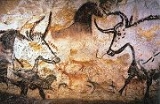
Behavioral modernity
Overview
Anthropology
Anthropology is the study of humanity. It has origins in the humanities, the natural sciences, and the social sciences. The term "anthropology" is from the Greek anthrōpos , "man", understood to mean mankind or humanity, and -logia , "discourse" or "study", and was first used in 1501 by German...
, archeology and sociology
Sociology
Sociology is the study of society. It is a social science—a term with which it is sometimes synonymous—which uses various methods of empirical investigation and critical analysis to develop a body of knowledge about human social activity...
to refer to a set of traits that distinguish present day human
Human
Humans are the only living species in the Homo genus...
s and their recent ancestors from both living primate
Primate
A primate is a mammal of the order Primates , which contains prosimians and simians. Primates arose from ancestors that lived in the trees of tropical forests; many primate characteristics represent adaptations to life in this challenging three-dimensional environment...
s and other extinct hominid lineages. It is the point at which Homo sapiens began to demonstrate a reliance on symbolic thought
Abstraction
Abstraction is a process by which higher concepts are derived from the usage and classification of literal concepts, first principles, or other methods....
and to express cultural creativity. These developments are often thought to be associated with the origin of language
Origin of language
The origin of language is the emergence of language in the human species. This is a highly controversial topic. Empirical evidence is so limited that many regard it as unsuitable for serious scholars. In 1866, the Linguistic Society of Paris went so far as to ban debates on the subject...
.
There are two main theories regarding when modern human behavior emerged.

